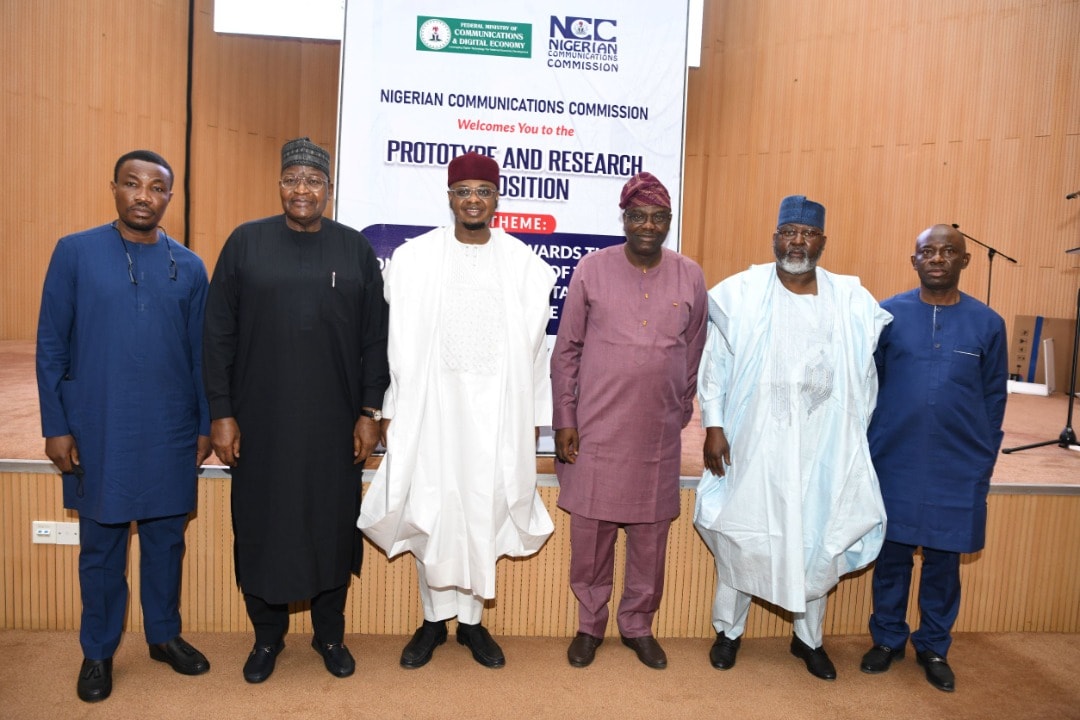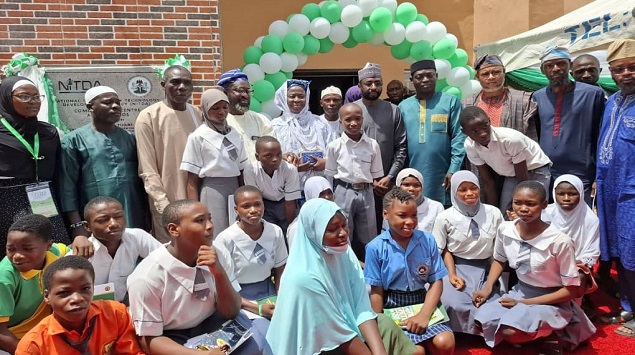General News
NCC Sets the Pace in FG’s Indigenous Tech Development Policy

The Nigerian Communications Commission (NCC) has given concrete expression to the Federal Government’s drive to promote indigenous innovative technologies in Nigeria’s telecommunication sector.

L-R : Dr. Kings Jack, Regional Manager North Central Region, Bank of Industry (BOI); Prof. Umar Garba Danbatta, Executive Vice Chairman/ CEO, NCC; Prof. Isa Ali Ibrahim (Pantami), Honourable Minister, FMCoDE; Prof. Adeolu Akande, Chairman NCC Board, Engr. Ubale Maska, Executive Commissioner, Technical Services, NCC and Mr Kelechi Nwankwo, Head, Research and Development, NCC, during the Prototype and Research Exposition that took place at the Communications and Digital Economy Complex, Mbora, Abuja.
The NCC demonstrated this by organising the maiden prototype and research exposition aimed at showcasing no fewer than 10 prototypes, arising of from its sponsored Telecommunications-Based Research Innovation Projects in the Nigerian universities.
At the event, which took place at the Commission’s Communications and Digital Economy Complex, Head Office Annex in Mbora District, Abuja, from 21–22, February 2022, the Commission selected 10 prototypes for exhibition as outputs of its telecom research project during the two-day event.
The top 10 prototypes include: Multiple operators’ enabled SIM, GSM communication-based walking cane robot, Powerline communications module, Home-grown electrical power charger, Low-cost GSM telephone system, Wireless power transfer device, Vital sign monitor, Plastic optical fibre cable, Wearable E-band tracker, and a Software-based nomadic base station.
The Commission is implementing the research and prototype exposition as a way of encouraging the commercializing of the prototypes, as an influential platform for universities, professionals and industry experts to come together, share information and build long-lasting business relationships.
Speaking at the event, Prof. Isa Ali Ibrahim Pantami, minister of Communications and Digital Economy, stated that, through the NCC’s telecoms-based research and prototype exposition, “the indigenous technological capabilities of Nigerians will be fully appreciated, harnessed, and utilised towards stimulating the overall productivity and sustainability of the telecommunications industry.”
Pantami emphasised that research is considered a necessary condition for the technological development of any nation and also regarded as the backbone of the communications industry, because it is the building block for the future development of advanced telecommunications products and services.
He tasked the mobile network operators (MNOs) to work with NCC to support indigenous technology development to solve national challenges in future.
The Minister commended the Commission’s Board and Management for facilitating the delivery of the lofty policy targets contained in the National Policy for the Promotion of Indigenous Content (NPPIC) 2021.
He also thanked the recipients of the Commission’s grants for the display of already developed prototypes for the knowledge of the industry stakeholders.
Speaking earlier, Prof. Adeolu Akande, chairman, NCC, Board of Commissioners, declared that the Commission will continue to provide the enabling environment to bridge the gap in the significant tripartite relationship among the academia, industry, and the government. He encouraged participants to support NCC’s initiative to succeed, as businesses will emerge, and sustainable jobs will be available for our young graduates on account of this new developments.
Also in his address, Prof .Umar Garba Danbatta, executive vice chairman and chief executive of NCC, reinforced the Commission’s commitment to discharging its role as an active regulator to drive the indigenous content development component of the nation’s telecoms sector.
The EVC reiterated the significance of building the indigenous technological capacities of Nigerians through partnerships with relevant stakeholders.
“The Commission has awarded grants to successful academic institutions to develop Working Prototype and Telecommunications-led Products capable of addressing industry needs and providing overall sustainability, fully-developed and ready-for-the-first phase of market entry”, Danbatta stated.
The EVC asserted that “it is important to have a commercialisation strategy to transit from rudimentary research into the market to address the local challenges and reduce the over-dependence on imported innovations and technologies with the attendant drain on the nations scarce foreign exchange.
“This is what this programme hopes to achieve to maximize the full potential of academia in contributing to the steady growth of the telecoms industry in Nigeria”.
General News
NOTAP Urges South Eastern Entrepreneurs to Embrace Franchising as Business Model

Dr. Obiageli Amadiobi, director general and chief executive officer, National Office for Technology Acquisition and Promotion (NOTAP), has advocated Franchising as a sustainable business model for the South East entrepreneurs.

Dr. Obiageli Amadiobi, DG/CEO, NOTAP
She made this call during a one-day sensitization and unveiling of the NOTAP Franchising Guidelines for south east stakeholders and entrepreneurs for a successful franchising business.
The DG who was represented at the event by Mr. Emeka Orji, head of Department Corporate Planning (CP) Department, NOTAP, said that franchising business model had globally been proven to be successfully sustainable due to low business risks associated with it.
She defines franchising as a contractual business relationship between a licensor (the franchisor) and a licensee (the franchisee) that allows the business owner to use the licensor’s brand and methods of doing business to distribute products or provide services to consumers.
She added that in essence, the franchisee pays the franchisor for the opportunity to use his established business model and brand name in running his business.
Dr. Amadiobi said the essence of the workshop was not just organised to explore the possibility of adopting franchising as a strategic platform to transform local dreams into national and global business realities.
She described the programme as an opportunity for business owners and intending entrepreneurs from the Zone to latch into the huge and untapped potentials provided by franchising business models in becoming business and brand ambassadors.
With over 800,000 franchise establishments across the globe, generating trillions in revenue, she described Franchising as a pathway to economic empowerment.
General News
FG Launches Online Citizenship, Business Management Portal to Enhance Transparency, Service Delivery
The Federal Government has launched a new Online Citizenship and Business Management Platform, in a bid to boost transparency, operational efficiency, and service delivery. The initiative, unveiled by the Ministry of Interior, is in line with the Renewed Hope Agenda of President Bola Ahmed Tinubu.
![]()
The platform is designed to simplify and accelerate the processing of citizenship and business-related services, allowing individuals and corporate entities to carry out transactions seamlessly from anywhere in the world.
According to a statement issued by Magdalene Ajani, Permanent Secretary of the Ministry, the digital platform represents a significant milestone in the Ministry’s ongoing reform agenda.
It noted that the new system would drastically reduce bureaucratic bottlenecks, enhance user experience, and improve turnaround time for applications. “The Ministry is committed to promoting a more efficient, transparent, and secure framework for citizenship administration.
“This digital transformation is a testament to our resolve to improve public service delivery through the use of technology”, the statement reads.
Members of the public, private organisations, and other stakeholders can now access the platform through the Ministry’s official website: https://interior.gov.ng, or directly via the portal: https://candb.interior.gov.ng. For technical support or inquiries, users can contact: candb-support@interior.gov.ng.
The Ministry emphasised that the launch of this platform is just one of several digital initiatives aimed at transforming the nation’s administrative processes and aligning them with global best practices.
Observers believe the platform could become a game-changer in reducing red tape and promoting a more investor-friendly environment in Nigeria, particularly in areas involving citizenship acquisition and business operations.
General News
NITDA DG says its Community IT Centres Should be a Catalyst of Change

Kashifu Inuwa Abdullahi, director general of National Information Technology Development Agency (NITDA) has said that the 18 community IT centre the agency has built in the past two years are meant to be a beacon of calls and catalyst of change in those communities where they are cited.

He sated this at the commissioning/handing over of IT centre at Akesan area in Lagos. He noted that the IT centres, Innovation hubs among others are part of digital literacy programme of the agency.
“This center is designed and build to help Akesan community to be part of the digital economy, because the President is big and loud when it comes to national prosperity and inclusivity.
“Our target is to build more than 1600 across the country. We want every community every Nigerian to be part of this national prosperity and inclusivity when it comes to digital economy.
“Today, we are here to commission it, to ensure and encourage you to put it in a good use, because we call it a community center means that we want everybody to be part of it. We don’t want it to be suited in a school where the school will lock it for only students and the staff.
“That’s why we located it in the community. Schools can be part of it. Our senior citizens can be part of it. Our religious centers also can be part of it to learn.
“We want it to be a beacon of call as well as a catalyst of change in this community. We want to see more information technology gurus coming from Akesan community. So, I want to encourage you to also come with a sustainability model so that the center will be on. It is on because when you invest in this kind of infrastructure, we don’t want to be called when there are small things that we should come and fix it. That’s why we are handing it over to the community so that the community can put it in a good use. The community can find a way to make it self-sustaining,” he said.
Dr. ‘Bosun Tijani, Honourable Minister of Communications, Innovation & Digital Economy, the NITDA Community Centre in Lagos, a space that is more than just a building. It is a strategic extension of our national mission – a bridge between the Federal Government’s digital economy policies and the unmatched energy, ingenuity, and innovation that Lagos represents.
The minister who was represented by Mr. Johnson Bareyei, director, e-governmance in the ministry, added that his ministry is committed to promoting inclusivity through capacity building initiatives like the 3MTT programme.
“We are also developing the National Digital Economy & e-Governance Bill, which is a robust legislative framework that will help guide our everyday engagement online.
“Our work at the Ministry also includes Project BRIDGE, our ambitious effort to improve interconnectivity by deploying 90,000km of fibre-optic cable across Nigeria. This is a critical imperative as we work towards making Nigeria a $1trillion economy powered by innovation, infrastructure, and inclusive growth,” he said.

 Telecom3 days ago
Telecom3 days ago₦800 Billion Infrastructure Plan Set to Boost MTN’s Network Quality Nationwide

 News3 days ago
News3 days agoCreative Economy Ministry Secures $300M Investments Commitment

 E-Business3 days ago
E-Business3 days agoNITDA, CISCO Empower Youth with Digital Skills

 E-Financial3 days ago
E-Financial3 days agoFidelity Bank reclaims trillion-naira market cap as stock rises to ₦21

 Telecom3 days ago
Telecom3 days agoAfrican Women Hit Hardest as Mobile Internet Gender Gap Persists

 General News3 days ago
General News3 days agoNITDA DG says its Community IT Centres Should be a Catalyst of Change

 Telecom3 days ago
Telecom3 days agoRemita’s Bold Leap: Nigeria’s Fintech Giant Expands Across Africa

 E-Financial3 days ago
E-Financial3 days agoKuda Co-founder Urges Young Developers to Build Tech with Purpose @NACOSS 2025




























